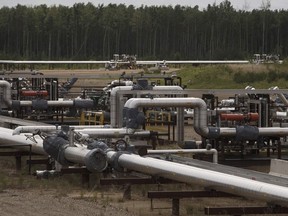Selling our energy at discounted prices to the U.S. has cost Canadians tens of billions of dollars in lost revenues.

Article content
While the full extent of the damage from U.S. President Donald Trump’s trade war remains unknowns, Canadians should understand that, with a federal election looming, shortsighted policies here at home have left Canada in a vulnerable position.
Advertisement 2
Article content
Article content
Recommended Videos
Article content
Oil and gas are Canada’s main exports and the U.S. is their primary destination. In 2023, nearly 97% of Canada’s oil exports went to our southern neighbour, and the U.S. is our sole foreign market for our natural gas.
This concentration of exports to a single destination has given the U.S. significant leverage. For example, Canada exports natural gas at discounted prices — up to 60% lower than what American producers receive in U.S. markets. Similarly, our oil has been sold for less than what U.S. producers receive, with price differences exceeding 40% in recent years.
Selling our energy at discounted prices to the U.S. has cost Canadians tens of billions of dollars in lost revenues.
And yet, over the last decade, the Trudeau government missed countless opportunities to reduce Canada’s heavy reliance on the U.S. and instead introduced regulatory hurdles that hindered our energy sector and limited access to new markets. To unleash Canada’s oil and gas sector, the next government must reverse a whole set of harmful energy policies.
Article content
Advertisement 3
Article content
For example, the Northern Gateway pipeline designed to transport crude oil from Alberta to B.C.’s coast. In 2016, one year after taking office, the Trudeau government cancelled this previously approved $7.9-billion project, which would have greatly expanded Canada’s access to Asian markets.
Then there’s the Energy East and Eastern Mainline pipelines from Alberta and Saskatchewan to the east coast. The Trudeau government effectively made the project economically unfeasible by introducing new regulatory hurdles, ultimately forcing the TransCanada energy company to withdraw from the project, which would have expanded access to European markets.
The record is equally bleak for liquified natural gas (LNG) export facilities, which could open access to overseas markets. Regulatory barriers and long approval timelines under the Trudeau government significantly hindered the development of the Énergie Saguenay LNG project in Quebec, the Repsol LNG plant in New Brunswick and the Pacific NorthWest LNG facility in B.C.
Advertisement 4
Article content
And when opportunity knocked to diversify our trading partners, the government failed to seize it. Following the Russian invasion of Ukraine, political leaders from Latvia, Ukraine, Germany, Greece and Poland turned to Canada seeking new LNG supply, but Trudeau insisted there was “no business case for LNG” and missed the chance to open new markets.
Finally, the Trudeau government’s Bill C-69 created massive uncertainty in project reviews and approvals by introducing vague assessment criteria including “gender implications” for major energy projects including pipelines and LNG export facilities. In fact, according to a recent report, which analyzed 25 major projects that entered the federal government’s review process between 2019 and 2023, almost every project submission remained stuck in the early stages (Phase 1 or 2) of the four-phase process, underscoring the inefficiency of the review process.
Advertisement 5
Article content
Meanwhile, the Trudeau government’s Bill C-48 restricts Canadian exports to Asia by banning large oil tankers from B.C.’s northern coast. And its targeted emissions cap, which requires only the oil and gas sector to cut greenhouse gases by 35% below 2019 levels by 2030, is designed to curtail energy production, further limiting Canada’s ability to meet global energy demands.
During the upcoming election campaign, Canadians should demand to hear how (or if) each party will remove barriers that hinder the development of energy projects and streamline approvals to unlock Canada’s untapped potential. Tariffs or not, Canada can’t afford to keep undermining its key export sector with regulatory barriers.
Julio Mejia and Elmira Aliakbari are analysts at the Fraser Institute.
Article content


